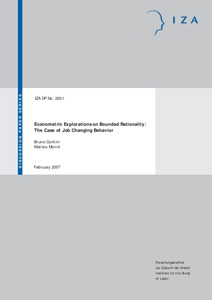Econometric explorations on bounded rationality: the case of job changing behavior
"In this paper we question the hypothesis of full rationality in the context of job changing behavior, via simple econometric explorations on microdata drawn from WHIP (Worker Histories Italian Panel). A rational outcome of the job matching process implies a positive tradeoff between future wag...
| Main Authors: | , |
|---|---|
| Institution: | ETUI-European Trade Union Institute |
| Format: | TEXT |
| Language: | English |
| Published: |
Bonn
2007
IZA |
| Subjects: | |
| Online Access: | https://www.labourline.org/KENTIKA-19125700124919439829-econometric-explorations-on-bo.htm |
| Summary: | "In this paper we question the hypothesis of full rationality in the context of job changing behavior, via simple econometric explorations on microdata drawn from WHIP (Worker Histories Italian Panel). A rational outcome of the job matching process implies a positive tradeoff between future wages and risk-on-the-job. The main result of this paper is that no “rational” tradeoff is observable after controlling for a variety of possible shifters. However, if we control for individual characteristics and replace wage growth by its predictor net of individual effects, the picture changes with the emergence of a significantly positive tradeoff between wage growth and risk-on-the-job. The interpretation is suggestive: while market forces (net of individual effects) drive towards a rational outcome, individual characteristics, instead of reinforcing the “rationality” of a positive tradeoff, lead towards the opposite direction of confounding good and bad options. Our explanation for these findings is that people act on the basis of bounded rationality à la Simon. If our assessment is correct, the implications are powerful: are there reasons to believe that such patterns are found only in the context of job search and worker mobility and not in other instances of economic behavior? Recent literature on bounded rationality strongly suggests the contrary. Why, then, should economists leave unchallenged and unchallengeable the hypothesis of full rationality? Had our investigation aimed at estimating the elasticities of wage growth and job safety of the workers’ utilities, we would have miserably failed. Is this a consequence of a misspecified model or of the wrong behavioral assumptions? Our support unquestionably goes to the latter. " |
|---|---|
| Physical Description: | 1 v. Digital |

